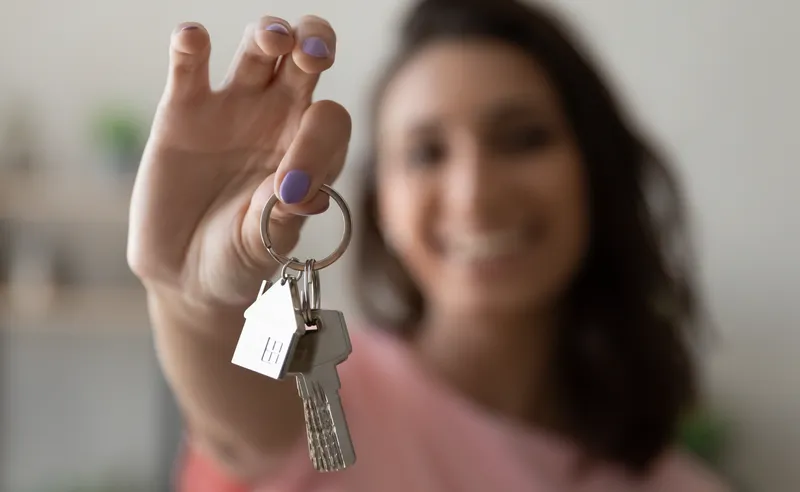Life in a metro: It’s hard for single women to find safe, judgement-free living spaces
Secure living spaces—without discrimination based on gender or marital status—is a huge challenge for single women in urban India.
Rumi (name changed), a single woman, had almost lost hope of finding a good rental accommodation in Bengaluru until a stroke of luck led her to a spacious, well-ventilated, and fully furnished accommodation.
This was too good to be true, especially since she had seen box-sized apartments that barely had any ventilation, barring a lone window that overlooked a nearby house, giving one a good display of the neighbours’ life.
Then came the stipulations from the house owner.
“No friends—male or female—can stay in the house. In case your family or friend visits you, then you need to inform me with all the details,” he told her, leaving Rumi in utter shock.
But, left with no choice, she had to compromise and opt for this place, which gave her everything she needed, except her freedom to have friends and family visit her.
This is not an isolated incident.
This is a scenario that many single women face in most Indian cities, with house hunting proving to an infuriating experience. But their woes don’t end here.
Experiences shared by single women with HerStory show that—even after they manage to find accommodation—they are often subject to discrimination and judgement based on their gender.
Being single: A deal breaker for landlords?
There are around 72 million single women in India, according to the Census. This may point to the growing independence and confidence of women in the country, but, unfortunately, many house owners do not view it from this perspective. For when it comes renting out spaces to single women, marriage seems to be a prerequisite for many landlords.
The experiences of single women highlight how modernisation of cities and women’s growing independence have done precious little to remove gender bias and traditional mindsets.
When Ruchita Chandrashekar, a mental health clinician in Bengaluru, began scouting for a house last year, every broker she met asked her if she was married.
“Every broker asks me if I’m married... From tomorrow, I will be masquerading as a married woman looking for a house in Bangalore,” tweeted Ruchita.
On the other hand, Rahul Parashar, who stays in a 4BHK apartment with his male friends in Gurugram, says he was never asked about his marital status while he was looking for houses.
Shekhar Pal, a house broker based in Noida, says some house owners want to rent out their apartments only to families or married couples. Even those who let out their houses to single women want to keep a check on what women do and whom they socialise with or bring home.
“Most of the landlords who rent out their apartments to single women want them to not drink, smoke or bring boys into the house. They fear society’s judgement if anything goes wrong,” he says.
Paati Purohit, a gender consultant at Arthan, a social enterprise, believes landlords often do not rent out their places to single women thinking they would indulge in activities that are “non-acceptable” by society and bring a “bad name” to them. And even if single women manage to find accommodation, they are often judged for their choices.
“Society judges women if they drink, smoke or have male friends. It wants to control and bind women wherever possible,” says Purohit.
Singled out
According to the Centre for Monitoring the Indian Economy, 39 million women were employed in the workforce in 2022. Many women move to metro cities for better job opportunities and to live independently.
But a life of independence in the city comes with a host of challenges for single women, as they often face gender bias from landlords—who not only impose restrictions and curfew on them, before letting out their houses, but also sometimes intrude into their personal space. Sometimes it’s covert, and sometimes the bias is blatant.

Niharika Sharma, a 27-year-old working woman in Delhi, recalls an experience she had while staying in a rented apartment in the city with two women.
The building owners lived in another house on the ground floor. They had also rented out a few rooms to some boys.
Sharma says her landlady kept an eye on everything the women did.
“One night, we came late from office. So the next day she asked me why we were late and inquired if we had brought in any boys,” she says.
The inquiries did not stop here. She also recalls being questioned by the landlady’s brother-in-law, when they brought home a few wine bottles.
Sharma feels they were being singled out because they were single women.
When Sharma asked the boys if they were facing any such problems with the house owners, she learnt—much to her surprise—that the owners were quite relaxed about their behaviour and even had a good laugh about their drinking and smoking habits. And there were never any questions about their social life.
Later, things escalated when an issue with the electricity units caused the building’s bill to skyrocket. The landlady blamed Sharma and her roommates for the high bill.
Sharma refused to pay as she knew there was some glitch in the units. However, instead of addressing the issue in a civilised manner, the landlady resorted to aggressive tactics, she says.
“She came to fight with us late at night. All the other residents gathered around but no one came forward to stop her. After that incident, I left the house without a second thought,” says Sharma.
She feels this incident was gender-driven as the other residents were not questioned about the electricity bill.
Restrictions and policing
The general stipulations imposed by landlords range from restrictions on house parties, drinking and smoking to curfew timings and entry of visitors.
Kavya Singh, a B-tech student from Greater Noida, was taken aback when her landlord said, “Padhne ki umar hai, college jao aur seedhe vapis ghar aau (This is the age to study, go to college and come back home straight).”
He also told her the house would be locked by 10 pm and she had to return home by then.
A Bengaluru-based landlord says such restrictions are imposed as they don’t want any kind of legal hassles arising from any activities that are considered “illegal” or causing "public nuisance". She says these restrictions apply to both men and women.
Some landlords also resort to self-assumed moral policing.
Shreya (name changed), a 22-year-old journalist from Bengaluru, still gets the jitters when she recalls her internship days. Her landlady had called the police at midnight to check her room as she suspected Shreya and her roommate of hosting male guests and engaging in "illegal" activities.
“In that one-month period, she used to barge into our room unannounced any time, just to check what we were doing. I felt so uncomfortable and unsafe in that house,” she recounts.
While restrictions may apply to both men and women, anecdotal evidence indicates that they seem to be enforced more strictly in the case of women.
Rahul Parashar from Gurugram says his landlords have not been intrusive or restrictive.
“My friends visit me often and we also party a lot,” he says. “I have never been questioned about who is coming into the house or what I am doing. I just make sure whatever I do does not cause any problems to my neighbours," he adds.
Sahil Choudhary, who lives in Bengaluru, also says he has never faced any restrictions or curfew. “I have changed houses twice in the city but I have never been asked to not drink, smoke or bring my friends over in the house,” he says.
Legal experts say all terms and conditions must be laid out for them to be enforced.
According to advocate Sujan Singh, terms and conditions must be clearly laid down in the rental agreement, and the tenant is required to follow all the conditions mentioned in the agreement or agreed to by them. He adds the landlords have the right to enforce reasonable rules and restrictions upon the tenants.
“However, any restriction which is beyond reasonability cannot be enforced if it is not agreed to or captured in the agreement,” he says.
Perception of single women

Kashish Sharma, a working woman from Noida, lives in a gated community. She says, once when her friend was visiting her, the guard at the gate stopped her and asked for details about the flat she was visiting. However, her friend could not provide all the details, and he refused to let her in.
When Sharma tried to speak to the guard about the incident, she says he behaved inappropriately and made personal comments. She recalls the guard’s comment: “Mein janta hu tum jaise ladkion ko (I know girls like you).”
“I feel if it had been a man or I was married, he would not have talked like this,” Sharma adds.
Gender consultant Purohit says single women are looked at as vulnerable people who can be taken advantage of. “This perception is compounded if the woman engages in any activity that is considered unconventional for women—such as smoking or drinking; then she is seen as a big red flag or a cause of concern,” she says.
Patriarchal mindset
Mala Bhandari, the founder of Social and Development Research and Action Group, which studies gender and conducts training for businesses, calls these restrictions and judgements on single women results of a “patriarchal mindset”, which “tries to hold back women”.
She says the attitude towards single women can vary depending on the generation in which one is raised; the older generations believe in more stereotypical gender roles. She adds that many people in society accord women a lower status than men, and these differences become starker when it comes to single women.
Bhandari is also of the view that the role of women in perpetuating gender inequality cannot be overlooked, as they too contribute to holding other women back.
Safety comes at a cost
The other challenge for single women in metros is that of safety. So some women are opting for houses in gated communities, although these apartments come with higher rents and deposits.
Tina Freese, a journalist based in Bengaluru, ended up paying more than her budget would allow to get secure housing in a gated community.
“Most house owners I met had unreasonable restrictions on timing and who is coming to the house. A few owners even refused to rent out their flat to me because of my profession,” she says.
However, after vigorous scouting, she found an apartment in a gated colony, but it came at an exorbitant rent.
“Since the owner was not living in the building, I decided to pay more than what my pocket allowed,” she says.
Education and awareness: Need of the hour
Safe, inclusive housing is a far cry in the country with urban dwellers experiencing discrimination and exclusion on several grounds, including gender, caste, economic status, and religion.
Secure living spaces, without discrimination or bias based on their gender or marital status, is a huge challenge for single women in urban India. However, this problem cannot be viewed in isolation and it stems from years and years of social, cultural and economic conditioning and prejudice.
These biases are so strong that when women try to break them, they face strong resistance, says Bhandari of Social and Development Research and Action Group.
She believes formal education and awareness play a significant role in shaping society’s belief system. She also emphasises the need for strong political leadership to bring about any meaningful change in society’s mindset.
“Gender equality is a generational change, which will slowly come. However, the path ahead requires a significant amount of sensitisation,” she says.
Edited by Swetha Kannan







